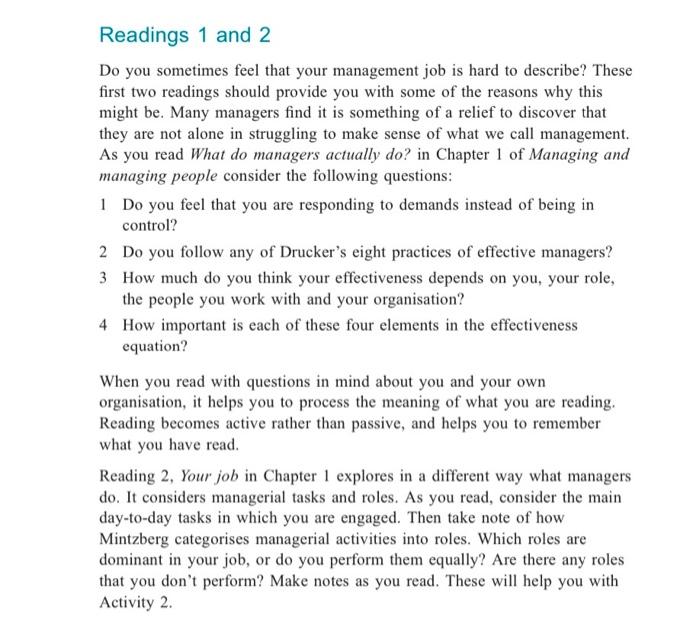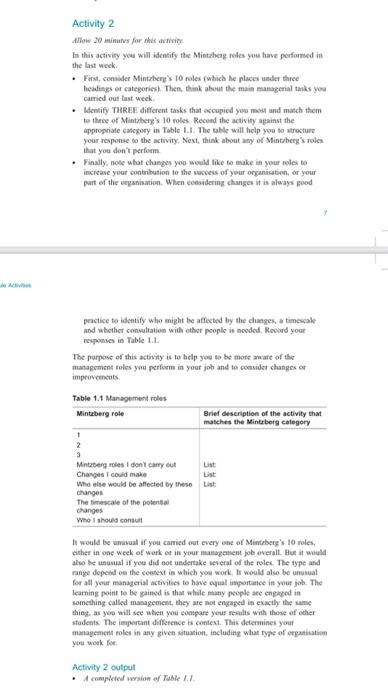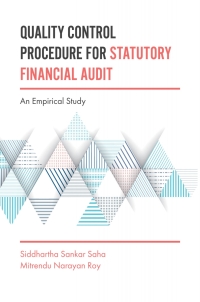Readings 1 and 2 Do you sometimes feel that your management job is hard to describe? These first two readings should provide you with some of the reasons why this might be. Many managers find it is something of a relief to discover that they are not alone in struggling to make sense of what we call management. As you read What do managers actually do? in Chapter 1 of Managing and managing people consider the following questions: 1 Do you feel that you are responding to demands instead of being in control? 2 Do you follow any of Drucker's eight practices of effective managers? 3. How much do you think your effectiveness depends on you, your role, the people you work with and your organisation? 4 How important is each of these four elements in the effectiveness equation? When you read with questions in mind about you and your own organisation, it helps you to process the meaning of what you are reading. Reading becomes active rather than passive, and helps you to remember what you have read. Reading 2, Your job in Chapter 1 explores in a different way what managers do. It considers managerial tasks and roles. As you read, consider the main day-to-day tasks in which you are engaged. Then take note of how Mintzberg categorises managerial activities into roles. Which roles are dominant in your job, or do you perform them equally? Are there any roles that you don't perform? Make notes as you read. These will help you with Activity 2. Activity 2 Allow 20 ls for this a In this activity you will entity the Mintzberg roles you have performed in the last week . First, consider Mintzberg's 10 roles (which he places under three healings or categories). Then think about the main managerial tasks you carried out last week Identity THREE different tasks that occupied you mest and match them to three of Mintzberg's 10 roles. Record the activity against the appropriate category in Table L.I. The he will help you to trochure your response to the activity, Next, think about any of Mintberg's roles that you don't perform . Finally, note what changes you would like to make in your roles to increase your contribution to the success of your organisation, or your part of the canisation. When considering changes it is always good practice to identify who might be affected by the changes, a timescale and whether consultation with other poople is needed. Record your responses in Table L.L. The purpose of this activity is to help you to be more wware of the management roles you perform in your job and to consider changes or improvements Table 1.1 Management roles Mintzberg role Brief description of the activity that matches the Mintzberg category 1 3 Mintzberg roles I don't carry out Changes I could make List Who else would be affected by these List changes The timescale of the potential Changes Who I should con It would be unusual if you carried out every one of Mintzberg's 10 roles. either in one week of work or in your management job overall. But it would also be unusual if you did not undertake several of the roles. The type and mange depend on the context in which you work. I would also be unusual for all your managerial activities to have equal importance in your job. The learning point to be gained is that while many people are engaged in something called management, they are not engaged in exactly the same thing as you will see when you compare your results with those of other students. The important difference is context. This determines your management roles in any given situation, including what type of ganisation you work for Activity 2 output completed version of Table 1.1. Readings 1 and 2 Do you sometimes feel that your management job is hard to describe? These first two readings should provide you with some of the reasons why this might be. Many managers find it is something of a relief to discover that they are not alone in struggling to make sense of what we call management. As you read What do managers actually do? in Chapter 1 of Managing and managing people consider the following questions: 1 Do you feel that you are responding to demands instead of being in control? 2 Do you follow any of Drucker's eight practices of effective managers? 3. How much do you think your effectiveness depends on you, your role, the people you work with and your organisation? 4 How important is each of these four elements in the effectiveness equation? When you read with questions in mind about you and your own organisation, it helps you to process the meaning of what you are reading. Reading becomes active rather than passive, and helps you to remember what you have read. Reading 2, Your job in Chapter 1 explores in a different way what managers do. It considers managerial tasks and roles. As you read, consider the main day-to-day tasks in which you are engaged. Then take note of how Mintzberg categorises managerial activities into roles. Which roles are dominant in your job, or do you perform them equally? Are there any roles that you don't perform? Make notes as you read. These will help you with Activity 2. Activity 2 Allow 20 ls for this a In this activity you will entity the Mintzberg roles you have performed in the last week . First, consider Mintzberg's 10 roles (which he places under three healings or categories). Then think about the main managerial tasks you carried out last week Identity THREE different tasks that occupied you mest and match them to three of Mintzberg's 10 roles. Record the activity against the appropriate category in Table L.I. The he will help you to trochure your response to the activity, Next, think about any of Mintberg's roles that you don't perform . Finally, note what changes you would like to make in your roles to increase your contribution to the success of your organisation, or your part of the canisation. When considering changes it is always good practice to identify who might be affected by the changes, a timescale and whether consultation with other poople is needed. Record your responses in Table L.L. The purpose of this activity is to help you to be more wware of the management roles you perform in your job and to consider changes or improvements Table 1.1 Management roles Mintzberg role Brief description of the activity that matches the Mintzberg category 1 3 Mintzberg roles I don't carry out Changes I could make List Who else would be affected by these List changes The timescale of the potential Changes Who I should con It would be unusual if you carried out every one of Mintzberg's 10 roles. either in one week of work or in your management job overall. But it would also be unusual if you did not undertake several of the roles. The type and mange depend on the context in which you work. I would also be unusual for all your managerial activities to have equal importance in your job. The learning point to be gained is that while many people are engaged in something called management, they are not engaged in exactly the same thing as you will see when you compare your results with those of other students. The important difference is context. This determines your management roles in any given situation, including what type of ganisation you work for Activity 2 output completed version of Table








